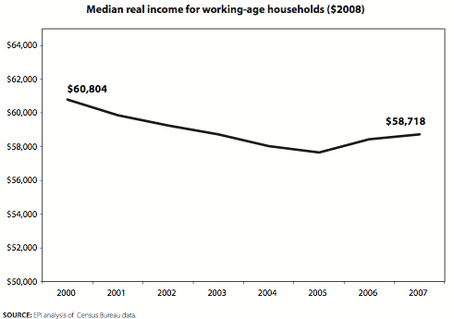Last week I grumbled about a New York Times portrait of Rep. Earl Blumenauer (D-Ore.) written by Matt Bai.
There were lots of problems with the piece, including the way it hinted that the bow-tied, bike-riding progressive Democrat was adopting language used frequently by conservative critics of Social Security to suggest that Americans can’t count on the Social Security Trust Fund to pay them their benefits.
The NYT cleared that up a few days ago with a correction:
The Political Times column on Thursday, about Representative Earl Blumenauer of Oregon and his approach toward the federal debt, characterized his view of the Social Security Trust Fund incorrectly. Mr. Blumenauer said he believes that the fund, backed by government securities, is solvent and will remain so for decades to come, but he argues that the balance between revenue and costs will need to be adjusted in order to guarantee full benefits for future generations. Mr. Blumenauer did not suggest that the trust fund is “make-believe money.”
The American Prospect went further today, doing a Q&A with Blumenauer to let him explain exactly where he stands on cutting spending, reforming entitlements, and working with Republicans. (Disclosure: I’m married to Mark Schmitt, the magazine’s executive editor.)
Here is Blumenauer, talking to TAP’s Tim Fernholz about the chances of reaching agreement on changes to Social Security:
What will kill it is that everyone is circling, and they want to hyper-politicize it, and they want to take the worst-case scenario they would imagine, and then they run with it to the extreme. Somehow you can’t look at reduction in benefits for wealthy people 30 years from now without threatening retirement security for middle-income people in the next decade. Well, that’s nonsense. But if everybody is going to have their worst case — “if you raise the tax, it’s going to be raised to some unacceptable level and shut down commerce and industry” — everything’s off the table and we lose a chance to move forward. Political opportunism and gridlock can win.
It’s a great use of the Q & A format to let a newsmaker talk about where he really stands. Well done to the Prospect.
–David Frum takes a long, interesting look at a story that’s been bubbling in Washington for the past couple of weeks: “The Purge at Cato.”
For those who aren’t in the loop (or inside the Beltway), the “purge” was the sudden departure of Brink Lindsey and Will Wilkinson from the Cato Institute.
As Frum succinctly explains it:
Lindsey was Cato’s vice president for research; Wilkinson a Cato scholar. They were working together on a book arguing for a new political approach fusing libertarianism and liberalism – a concept that Cato has previously endorsed on issues like drug control, foreign policy, and sexual freedom.
Lindsey and Wilkinson missed the memo announcing that Cato was going all-in with the Tea Party movement.
As we’ve said before, think tanks are playing a bigger and bigger role in politics and policy debates, but the press rarely gives them the scrutiny they deserve.
Frum’s attention to Cato is especially well timed, given the interest generated in the institution by Jane Mayer’s New Yorker profile of the billionaire Koch brothers, who have provided much of Cato’s funding.
Frum, a former Bush speechwriter, knows more than most about the inner workings of right-wing think tanks; he lost his job at the American Enterprise Institute this year after criticizing the GOP’s strategy on healthcare. He uses that experience to put the latest Cato happenings into context, and to explain why, with Republicans poised to make big gains in November, readers should care what happens inside these institutions:
There’s little other policy inventory, because the think tanks have not done their proper work. Without a think tank agenda, the new majority will rapidly decline into a brokerage service for K Street.
It’s a fascinating story, part of a larger narrative that should get much more attention from the press.
–Ezra Klein likes charts. So do we. So as we head into the long weekend, it seems smart to follow Ezra’s lead and look at this:

Yeah. That’s what’s happened to median income for working-age households. And, as Ezra notes, “the graph ends in 2007—before the Great Recession had actually begun.”
The source of that depressing downward graph is the Economic Policy Institute’s new paper on the deterioration of living standards from 2000-2007, and how that’s been made worse by “a broad-based collapse of wage growth over the last two years.”
Something to think about on Labor Day.
Holly Yeager is CJR’s Peterson Fellow, covering fiscal and economic policy. She is based in Washington and reachable at holly.yeager@gmail.com.
